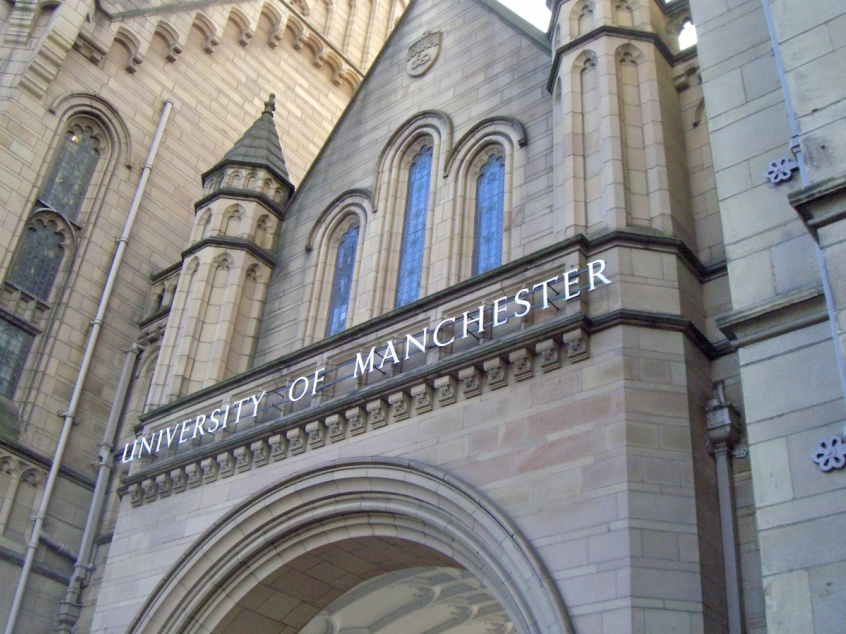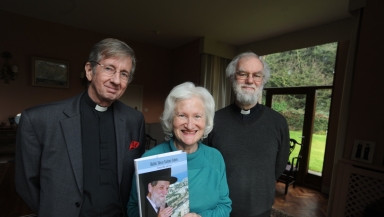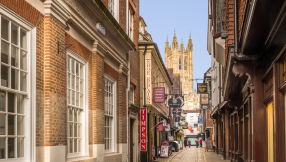
A heavyweight group of national Jewish leaders is demanding that Manchester University removes books by the Holocaust denier David Irving from 'open access' in its main library.
A letter appealing to Manchester's vice chancellor Dame Nancy Rothwell will been sent this week, jointly signed by the Jewish Leadership Council, the Board of Deputies of British Jews, the Holocaust Education Trust, the Union of Jewish Students and the Community Security Trust.
The intervention marks a major boost for the ongoing campaign to persuade the university to change its position, led by Rowan Williams, the former Archbishop of Canterbury, Irene Lancaster, an eminent Jewish academic, and Guy Wilkinson, Dr Williams' former interfaith adviser.
It follows a letter sent last month by Dr Williams alongside repeated requests from Dr Lancaster as well as the local Labour MP, Graham Stringer, and coincides with a separate letter this week from local councilor John Merry on behalf of the City Mayor of Salford, who writes: 'As a local councillor who represents thousands of Jewish residents I feel personally very upset about this unfortunate situation.'
Dr Williams wrote that the issue needs 'urgent attention' and warned that the current arrangement of Irving's work 'could be experienced as threatening by Jewish members of the University'. In response, the university said it was considering re-cataloguing the books but refused to move them from open display in the John Rylands library.
In their new letter, addressed to Dame Nancy, the Jewish leaders write: 'We understand that you have already received multiple complaints regarding these books and are yet to take appropriate measures. David Irving was labelled by a High Court Judge as an antisemitic, racist Holocaust denier in 2000 when he lost his libel case against historian Deborah Lipstadt. Irving was subsequently sentenced to three years in an Austrian prison following speeches in which he referred to the "gas chambers fairy tale" and called the Holocaust a "myth". More recently he spoke at a far-right event in London where, according to press reports, Auschwitz was compared to Disneyland and the death of Jo Cox was referred to as "cheery news". The fact that his writings can be found on the same shelves as books by legitimate historians is not just an insult to the victims of the Holocaust and their descendants, but also risks these books being endorsed as accurate historical fact.'
The Jewish leaders then call on the university to follow the example of Churchill College, Cambridge who in February removed Irving material followed a complaint by Lancaster, and other institutions such as neighbouring Manchester Metropolitan University who do not show Irving books on open display.
They appeal for the university immediately to remove all Irving literature from open-access shelving; appropriately label these books as being authored by a convicted Holocaust denier; re-catalogue the books; and permit access to such material on application for the purposes of genuine academic research.

'We firmly believe that these steps are wholly appropriate to ensure that these books are not seen as legitimate historical resources but are still available for academic purposes,' the Jewish groups write. 'The University of Manchester has attracted Jewish students from across the UK for many years and we feel that it is therefore of great importance that you are seen to take this matter seriously.'
The intervention comes after Lancaster received a letter from the office of Jo Johnson, the higher education minister who Dr Williams also wrote to in February, saying that responsibility for the books was down to the individual institutions and justifying their presence on grounds of 'free speech'.
Johnson's office wrote to Lancaster: 'The issue you have raised is an important one. The Department for Education in no way condones such literature, however, free speech and academic freedom are fundamental to our higher education system and wider society. Many higher education institutions, including universities, have a legal duty to take reasonably practicable steps to secure freedom of speech within the law for their members, students, employees and visiting speakers. Our universities must be places where there is open debate and challenge, which may involve allowing judgment-free access to lawful material, however objectionable.'
However, Dr Williams said in response: 'It's a very inadequate reply because it still misses the point, which is not about securing academic freedom but about (a) responsible direction given to students about the character of the literature to which they are exposed and (b) proper assessment of the risk of material being experienced as threatening or supportive in some way of harassment. Neither of these points is dealt with.
'Granted that universities are autonomous and make their own rules, it seems to me more than ever necessary for clear guidance about good practice on this specific point.'
Canon Wilkinson added: 'Surely the government has a responsibility to hold them to account and demonstrate that their decisions comply with the law and are in the best interests of students.'
The row follows demands that universities do more to tackle antisemitism on campus and a rise in the number of reported incidents involving Jewish students and academics.
Last year, the respected peer and academic Ruth Deech warned that some of Britain's leading universities were becoming no-go areas for Jews. Naming Manchester, Soas, Southampton and Exeter, Lady Deech told the Telegraph: 'Amongst Jewish students there is gradually a feeling that there are certain universities that you should avoid.'
Lancaster, who was the first teaching fellow in Jewish history at Manchester University, said: 'I am no longer able to recommend Manchester University as a suitable place for the study of history, let alone Jewish history, and I seriously fear for the continuing safety of Jewish students and staff on the Manchester University campus.'
In his earlier letter, Rowan wrote to Dame Nancy: 'I ... have concerns over the shelving of works like those of Irving alongside routine historical texts. Given that his work has been declared by experts like my colleague Sir Richard Evans to be undeserving of the name of history and to be characterised by deliberate falsification of material, it is not a question of alternative interpretations of history or of expressions of simple opinion, but of a very specific genre of literature, quite distinct from history.
'Of course students should be allowed to read it for approved academic purposes, but there is, it seems to me, a strong case for shelving or labelling it independently to clarify its nature. And not doing so could be open to the challenge that its presence without such clarification could be experienced as threatening by Jewish members of the University, in the sense spelled out in official definitions of anti-semitism and listed on the website, "The Law of Anti-Semitism".
'At a time when there is, nationally and internationally, a measureable rise in the expression of extremist views I believe that this question needs urgent attention.'













